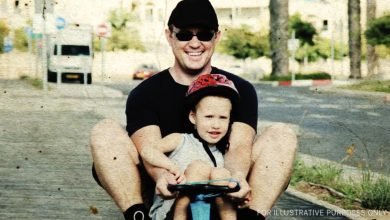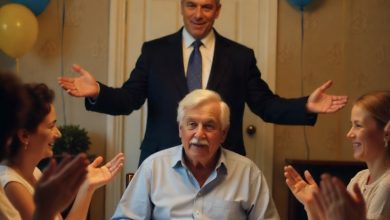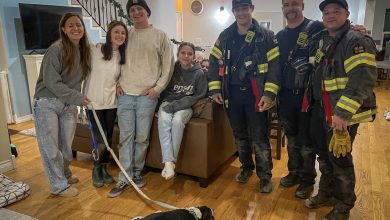“The Day an Overlooked Stranger Changed Everything Inside a Busy Company”

I was only a quiet intern when I noticed an elderly man being ignored in the lobby. People were walking past him as if he didn’t exist. I greeted him in sign language, not realizing that the CEO was watching from above—or who this man truly was.
At that time, I was twenty-two, just a timid intern at Meridian Communications, one of the biggest advertising agencies in Chicago. My days were filled with small tasks: making copies, bringing coffee, organizing supplies, and staying out of everyone’s way. I often ate lunch at my desk, avoiding conversation, and sometimes even used the stairs instead of the elevator just so I wouldn’t have to deal with awkward small talk.
To most people at the company, I was invisible. But to me, my one real source of pride was something that had nothing to do with my job—my fluency in American Sign Language. I had learned it for my younger brother, Danny, who had been born deaf. Our parents tried, but they struggled to learn. I, however, had thrown myself into it with determination. By the time I started my internship, I could communicate fluently with Danny. It was the one skill I valued most in myself. Still, inside the shiny world of corporate marketing, that talent felt completely irrelevant.
That morning in October started like every other. The lobby was buzzing with employees rushing to prepare for a big client presentation. People carried stacks of reports, models, and boards covered in campaign ideas. The atmosphere was frantic. I was stationed at the front, helping organize packets, when I saw him.
The man stood out immediately. He was elderly, perhaps in his seventies, dressed in a perfectly tailored navy suit. He looked dignified, but also out of place. His eyes were filled with frustration and something else—sadness.
He was standing at the front desk, trying to communicate with Jessica, the receptionist. Jessica was good at her job, but she was stressed that morning and didn’t have the patience she usually showed.
“Sir,” she said sharply, “I don’t understand. Do you have an appointment? Could you write it down, maybe?”
The man gestured with his hands, pointing at the elevators, mouthing words that produced no sound. That’s when I saw it: he was using sign language. Not very obvious, but it was there—the shapes of the fingers, the expressions on his face. He was trying to finger-spell something.
Jessica, not understanding, moved on to help someone else. He was left standing there, lost, while people in suits brushed past him without so much as a glance.
I froze. My supervisor, Margaret, had been clear—my role that day was to support the presentation team. I wasn’t supposed to interfere. But as I looked at the man’s slumped shoulders, I thought of Danny. I thought of all the times people had ignored him or pretended they didn’t see him because they didn’t know how to communicate. The image was too close to home.
I couldn’t just stand there.
Taking a deep breath, I walked over to the man. His eyes met mine, tired and wary, already expecting another dismissal. Instead, I lifted my hands and signed: Hello, my name is Catherine. Can I help you?
The change on his face was immediate. His eyes widened, and his mouth curved into a smile full of relief. “You sign,” he signed back with practiced ease. “Thank God. I was beginning to think nobody here could understand me.”
“I’m so sorry,” I signed quickly. “What do you need?”
“I’m here to see my son,” he explained. “But I don’t have an appointment. The woman at the desk was very busy.”
“What’s your son’s name?” I asked.
He hesitated, pride and uncertainty flickering across his features. Then he signed: Michael Hartwell.
I nearly forgot to breathe. Michael Hartwell was the CEO of Meridian Communications. His office took up the entire top floor. His name carried power through the building. People whispered about him whenever he appeared.
“Mr. Hartwell is your son?” I signed, shocked.
“Yes,” he confirmed. “I was nearby and thought I might stop in for a few minutes. But I know he’s busy.”
I offered him a seat and promised to make some calls. Inside, my heart raced. How was I supposed to arrange a meeting with the CEO? Still, I picked up the phone and called his assistant, Patricia.
“This is Patricia, Mr. Hartwell’s office.”
“Hi, Patricia. This is Catherine Walsh from the intern program. I have someone in the lobby who says he’s Mr. Hartwell’s father.”
Silence stretched on the line. “His father?” she repeated at last.
“Yes. An older gentleman. He’s been waiting.”
Another pause, heavier. “Have him wait. I’ll check with Mr. Hartwell.”
I hung up, uncertain. But while we waited, the man—Robert Hartwell, as he introduced himself—began to tell me stories. He was an architect, he said, and had designed several of Chicago’s skyscrapers. His wife, Michael’s mother, had been a teacher at a school for the deaf. He shared memories of Michael as a child—how determined he’d been, how eager to prove that having a deaf father didn’t make him weaker.
As Robert spoke, his pride was obvious, but so was his sadness. He worried his son had forgotten how to slow down, how to connect.
Patricia called back eventually: Michael was in meetings and wouldn’t be free for at least an hour. Disappointment washed over Robert’s face. He signed that maybe he should leave.
“You don’t have to go,” I told him. “Would you like to see the building while you wait?”
His eyes brightened. “I’d like that.”
So, against every rule I knew, I gave him a tour. We walked through the creative department, the marketing teams, and the design studios. Everywhere we went, I signed conversations to him, and his face glowed with pride.
Of course, my phone buzzed with messages from Margaret, asking where I was. I ignored them. Robert’s happiness mattered more in that moment.
It was while we were walking past the analytics department that I noticed him. Michael Hartwell stood on the mezzanine above, half-hidden behind a pillar. He was watching us—watching me sign for his father. My stomach flipped. Was this the end of my internship? When I looked again, he had vanished.
We finished the tour and returned to the lobby, where Robert prepared to leave. That’s when Margaret stormed over, her face tight with anger.
“Catherine,” she snapped, “a word. Now.”
Before I could respond, a calm voice cut through the lobby: “Actually, Margaret, I need to speak with Miss Walsh first.”
I turned and froze. Michael Hartwell himself was walking toward us. Tall, confident, with eyes sharp like his father’s, he looked every bit the leader everyone whispered about.
Margaret stammered, but Michael silenced her with a look. “She was helping my father,” he said quietly. “And she did it beautifully.”
The room fell silent. Michael turned to Robert and signed, haltingly but with clear effort: “I’m sorry I made you wait. I didn’t know you were here until… I saw you with Catherine. I haven’t seen you look this happy in years.”
Robert’s face lit up with joy. “You’ve been learning to sign?”
“I’ve been trying,” Michael admitted. “I should have done it long ago.”
Then, in front of everyone, father and son embraced. My eyes stung with tears.
Afterward, Michael asked me to join him in his office. There, with his father beside him, he said, “Miss Walsh, I owe you an apology. You did more for this company today than most people ever will. You made my father feel welcome.”
I tried to protest, saying I had abandoned my duties, but he stopped me. “What you did was the very definition of what we claim to value: inclusion. I’ve decided to create a new position—Director of Accessibility and Inclusion. I want you to fill it.”
I was stunned. Me? I was just an intern. But he insisted. “You have empathy. You have vision. And you have skills we desperately need.”
That day changed my life. I accepted the role and, over the next months, helped transform Meridian Communications. We installed visual alerts, brought in ASL interpreters, set up accessibility guidelines, and trained employees to understand inclusion not just as an idea, but as daily practice.
Six months later, we won a national award for workplace inclusion. Michael asked me to accept it on behalf of the company.
“This award,” I said in my speech, “isn’t about business strategies or campaigns. It’s about remembering that every person deserves to be seen and valued. The greatest skill in business is not closing deals—it’s recognizing humanity.”
As I spoke, I saw Robert in the audience, clapping in sign language, his face glowing with pride. Beside him, Michael smiled, their bond restored.
And me—the shy intern who once felt invisible—had found her voice by helping others be heard. It all began with a simple hello, signed in a crowded lobby to a man who only wanted to belong.










